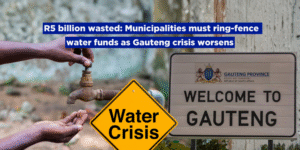President Ramaphosa’s announcement this evening of changes to his national cabinet is less a reshuffle and more a gratuitous bloating. Contrary to a commitment made in 2019 to reduce the number of ministries in the South African national executive, he has chosen to augment his cabinet by a further two ministries.
The Minister of Electricity and of Planning, Monitoring and Evaluation, will add an additional R74 million to the public wage bill. It is simply unfathomable that the President can push this cost onto the South African taxpayer while the nation languishes under sluggish economic growth, the highest unemployment rate in recent history, and an electricity crisis that is shedding jobs at record numbers.
It is important to note that the new Minister of Electricity in the Presidency, Kgosientsho Ramokgopa, nearly singlehandedly wiped out the City of Tshwane with a smart meter contract declared highly irregular by the Auditor General when he was the metro’s mayor. If Cyril Ramaphosa thinks that Ramokgopa will solve the electricity crisis, then permanent blackouts are inevitable.
There was also no announcement of performance agreements, targets, or tangible outcomes and timelines for the above ministries, making it impossible to gauge whether or not either of these ministers perform. Housing both of them in the Presidency also means that these ministers will be shielded from accountability in Parliament where a Committee on the Presidency still does not exist.
But it is less about who President Ramaphosa has added to his cabinet and more about who has remained or simply not faced any consequences for dismal performance. Nkosazana Dlamini-Zuma/s move from COGTA to Women, Youth, and People with Disabilities demonstrates that there are no consequences for the sole individual who ravaged our economy with irrational regulations under a National State of Disaster for the coronavirus pandemic.
Minister Patricia De Lille has faced no consequences after the millions wasted on the Beitbridge washing line, or her abject failure to prevent the fire which razed the National Assembly and gutted the country’s legislature.
Similarly, South Africa’s worst police minister in history, Bheki Cele, whose leadership has led to crime statistics worse than those of war torn countries, remains in his position as Minister of Police. This is a slap in the face to the millions of South Africans who have fallen victim to murder, rape, and violent crime on a daily basis.
The same can be said for Ministers Pravin Gordhan, Ibrahim Patel, Gwede Mantashe, Angie Motshekga, and Blade Nzimande. In each of these portfolios, South Africa’s metrics have only gone backwards due to non-performance and corruption.
Aside from these notable changes, or lack thereof, President Ramaphosa has merely moved around a batch of broken eggs in the same basket. There is no expertise brought in from the private sector, no consequences for ministers who have failed dismally in their existing roles, and no show of bravery and backbone by the President to rid his cabinet of ministers who have repeatedly plunged South Africans into disaster.
South Africa has very little to look forward to under this reshuffled cabinet. The only way for a new, effective cabinet to come in and rid us of failure and incompetency, is for a cabinet to be appointed that is free of the ANC. Until then, South Africa can only expect more of the same. More inaction, more loss, and more despair – because this is what South Africans equate to Ramaphosa and his government.




